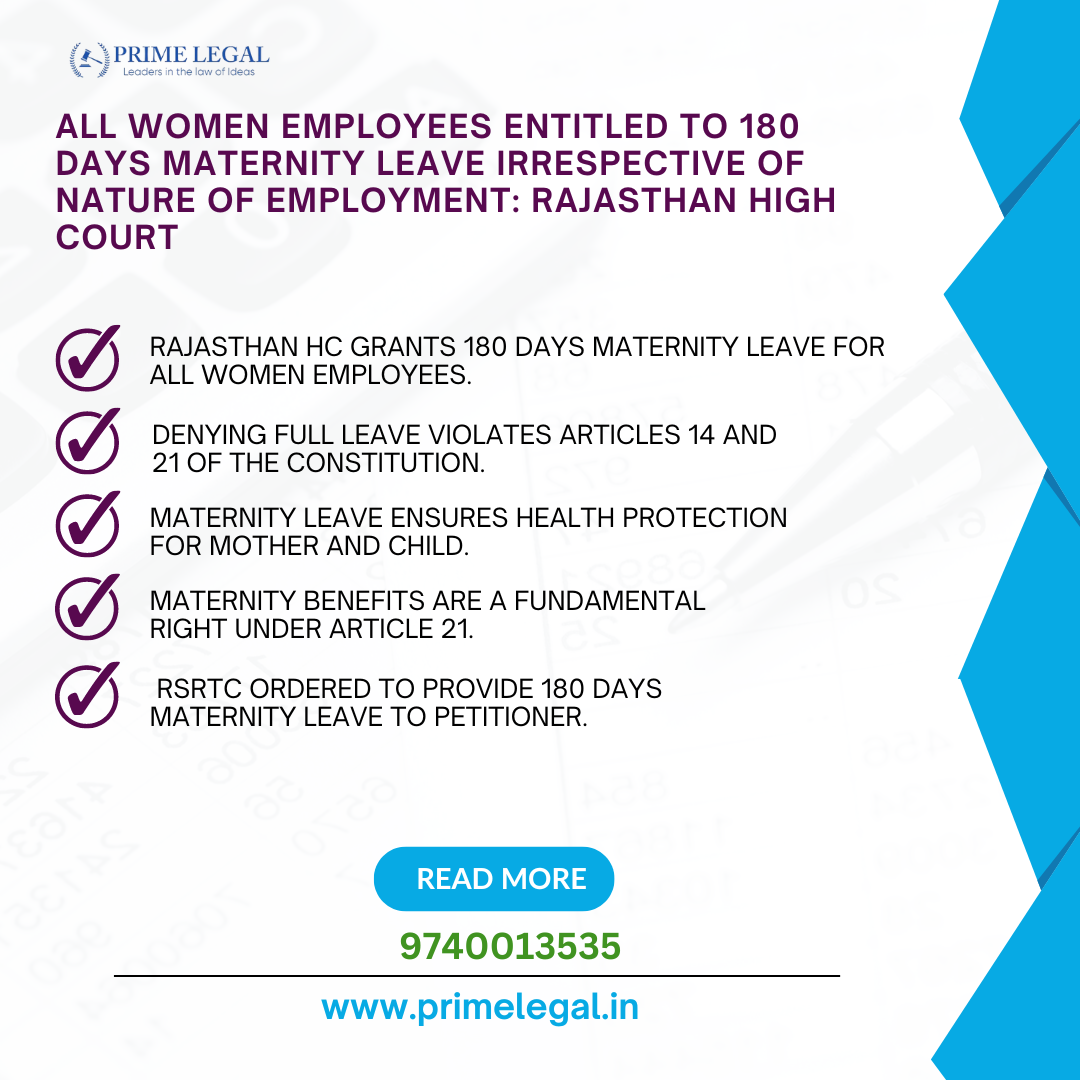BRIEF OVERVIEW-
Pursuant to a writ petition filed by one of the conductors with the Rajasthan State Road Transport Corporation (RSRTC) requesting that her maternity leave be extended to 180 days, the petitioner argued that this is a practice that is allowed in other sectors, except RSRTC, On the other hand, the judge Anoop Kumar Dhand, however, held that the petitioner is entitled to 180 days of Maternity Leave, just as other females within ‘The service rules’ applicable to female employees in the state and quirk, bill ‘2017’.
“Women contribute to half of the segment of our society and they have to be honoured and treated with dignity at all places, including where they earn their livelihood. Whatever be the nature of the duties, in the place where they work, they must be provided with all facilities to which they are entitled for.”
Findings of Rajasthan High Court in this case are reproduced from Minakshi Chaudhary v/s Rajasthan State Road Transport Corporation.
FACTUAL NOTION-
In the instant matter, the petitioner, a female conductor employed by the Rajasthan State Road Transport Corporation (RSRTC), is a married woman who became pregnant. She sought maternity leave for 180 days but was sanctioned only for 90 days according to Regulation 74 of the RSRTC Employees Service Regulations 1965.
The petitioner argued that according to the Maternity Benefit Act, 1961 and its amendments 2017, all women employees have a period of leave of 26 weeks (180 days). But still the petitioner was granted only 90 days which was not only discriminatory but also was not in line with the practice for other government employees.
The. On the flip side, the respondents contended that maternity leave as set out in 1965 carried an additional 90 days as out of regulation which RSRTC had done and thus no illegality had being committed. The respondents submitted that the governing regulations in this case, regarding the employment at the RSRTC, permitted NOR more than 90 days leave and therefore, the petitioner could claim no more under these regulations.
COURT ANALYSIS/ DECISION-
The Court reinforced its views on maternity leave when it comes to protecting both the health of the mother and the child from the burden of work. The Court remarked that “the health of the mother and the newborn is of utmost importance not just for the child’s interest but for the progress of any nation. The present generation of children will lead the development of tomorrow.” The Court maintained that to rob the women and their infants of such basic benefits is to kill the future of the nation. The Court emphasized that “Maternity Leave is more than a benefit; it is a right that protects the primary responsibility of a woman as the caregiver.”
The Court considered the laws governing the court’s jurisdiction namely RSRTC Regulation 74, Rajasthan Service Rules, CCS Rules and the amendments in the Maternity Benefits Act amendment act of 2017. The Court observed that neither maternity nor paternity leave is simply a policy consideration but it is a statutory provision which forms part of the basic rights and freedoms guaranteed in Article 21 of the Constitution of India. The Court further asserted that this right extends to all women without discrimination to the employment of a woman for which maternity leave is required.
“Maternity Leave benefits are not merely legal entitlements; they are essential rights that embody a woman’s identity and dignity as she embarks on the journey of starting a family. The right to have children is safeguarded under Article 21 of the Indian Constitution, which is part of the Fundamental Right to Life and Personal Liberty.”
The Court referenced the Female Workers (Muster Roll) case, where the Supreme Court highlighted that maternity leave is crucial for women’s dignity and equality, asserting that it cannot be compromised. This led to the extension of maternity benefits to muster-roll workers, drawing on the Doctrine of Social Justice. Additionally, in the Bandhua Mukti Morcha case, the Supreme Court acknowledged maternity benefits as a vital component of the right to live with dignity under Article 21 of the Constitution of India.
The Court emphasized that “the State must ensure that pregnant working women receive all necessary support and protection for their health and that of their child while keeping their jobs.” With the changing legal landscape, the Court noted that refusing the petitioner 180 days of maternity leave is not only discriminatory but also infringes on their fundamental rights under Articles 14 and 21 of the Constitution of India, especially since women in other departments enjoy the same benefit. The Court acknowledged maternity leave as a vital welfare measure and a fundamental right under Article 21.
“The refusal of 180 days of maternity leave to female employees at RSRTC, including the petitioner, violates a woman’s right to childbirth and maternity leave as outlined in the Act of 1961 (amended in 2017).”
The Court ruled that the petitioner, as a female employee of RSRTC, is entitled to 180 days of maternity leave in line with the provisions of the RSR, CCS Rules, and the Maternity Benefit (Amendment) Act, 2017. The Court instructed RSRTC to grant the petitioner the full 180 days of maternity leave.
“PRIME LEGAL is a full-service law firm that has won a National Award and has more than 20 years of experience in an array of sectors and practice areas. Prime legal fall into a category of best law firm, best lawyer, best family lawyer, best divorce lawyer, best divorce law firm, best criminal lawyer, best criminal law firm, best consumer lawyer, best civil lawyer.”
Written by- ALOK G. CHHAPARWAL


